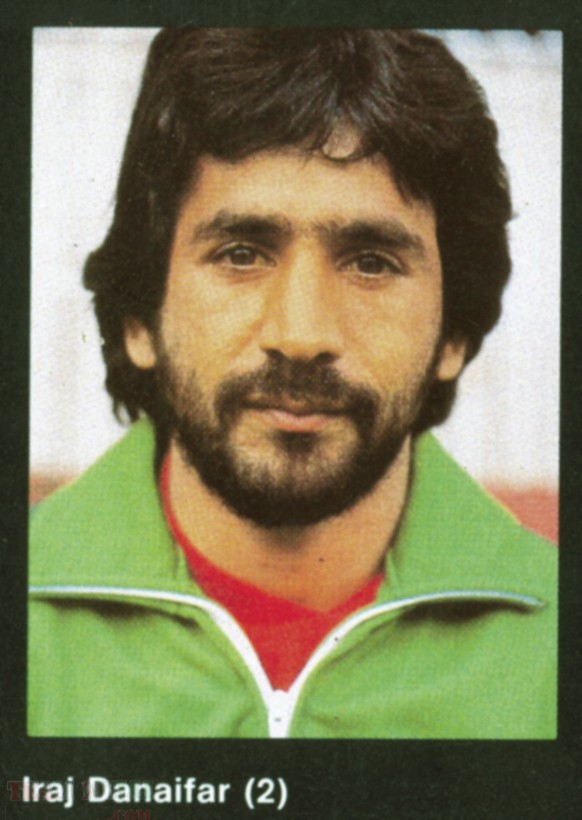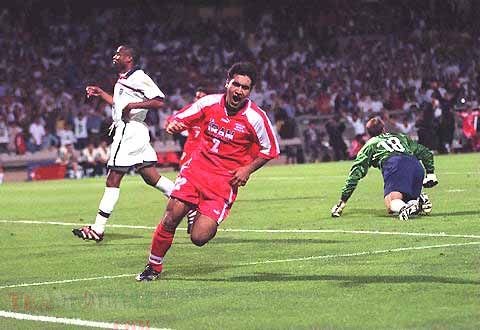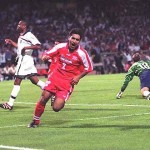This article ” Irán, tras otro milagro de fútbol” was written in Spanish by WALDEMAR IGLESIAS and published in the Argentine newspaper Clarin. The electronic translation is from the newspaper website. Original article is found here.
The second rival Argentina in the World is marked by conflict and selected by a memorable victory in World against U.S. It comes as one of the top two in the Asian Cup. Watch the video of the historic victory of Iran in France 98
Redondo Metro , Iran
04/02/14 – 10:33
Sayed Jalal Talebi, the coach of Iran explained it clearly in the days before. “in the locker room, those ninety minutes would last forever. Defeat could have the character of a life sentence. But a victory would transform them into celebrities territory in which football is also a space for expression.” Talebi , the coach of Iran football , talking about his players who played in that famous June 21, 1998 match, at the Gerland Stadium, under the sky of Lyon, France in World Cup. Opposite U.S.A rival in the field of international politics since the 1979 Islamic Revolution. That match raised much interest in every aspect but less in footballing terms as an event which was mentioned in every corner of the planet. The British magazine FourFourTwo called it the most politically charged match in history . But for the world and the millions of people watching , around the globe, the television showed mutual regards, respect and even flowers exchanged between the two rivals as a treat. The players of both teams posed together for photos and mingled. Even in the stands, both groups of supporters shared the traditional wave that had become popular from Mexico 1986.

That day, Iran felt like an instant world champion. Beyond the suspense that was forced by the rebound of by Brian McBride with only three minutes of the game left, it was a party that moved from the heart of Western Europe to the streets of Tehran, Mashhad, Isfahan and Karaj. 2-1 victory created its own heroes: Hamid Estili got a header, flicking the ball over the goalkeeper Kasey Keller and celebrated as if he wanted to embrace the whole country. Since then became an emblem also outside the field: Sayyed Ali Khamenei Supreme Leader of Iran expressed his appreciation to him in public; and the man wearing the number nine bluntly expressed himself as a follower and admirer of former President Mahmoud Ahmadinejad. The second goal was scored by one of the most prominent Iranian soccer players of all time: Mehdi Mahdavikia. with a burst of speed in a supersonic counter, ran leaving his chaser for dead , beat them all with sheer speed from the left, before the advancing goalkeeper came rushing , but Mahdavikia beat him as well with the tip of his right loot. That match and his performance in the World Cup helped him to be transferred to Germany: from then until 2010 he played in the Bundesliga for Hamburg, Bochum and Eintracht Frankfurt.
Football in the country was traversed by conflicts , as was the life of normal Iranians. After the Revolution of 79, between 1980 and 1988 the war with Iraq was followed. The consequences were estimated at a million dead, more than two million injuries and four million displaced by the horror. Football took a back stage. Until those painful days , the national team , Team Melli , was a machine to beat:
consecutively winning three Asian Cups played between 1968 and 1976 with a perfect record. Two years after this excellent series in Argentina, Iran debuted in the World Cup. Team Melli debut was a 0-3 loss against Holland in Mendoza. Four days later, a milestone happened: Cordoba, Iran scored its first goal (by Iraj Danaeifar) and scored its first point with 1-1 draw against Scotland.
Then out into the world, the most popular sport also became a prisoner of war. Federation decided to withdraw from the FIFA 82 Spain and refused to participate in 86 of Mexico’s inability to play in their own territory. For security issues, FIFA claimed that their matches should be played in neutral cities. Local competition was also affected. Only in the nineties , after the war ended , the restructuring of the league and football started to take shape. Until it became ripe with the generation of 98-led by Ali Daei, the player with more goals and more games in the history of Team Melli. This generation was to bring Iran back to the world stage.
Apart from conflicts, football is a tradition. The film “Offside” by the famous Iranian director , Jafar Panahi , is a testament. The subject of the film was attempt to watch a World Cup 2006 qualifying match against Bahrain in the stadium. Iranians have a passionate and unanimous support for the teams that represents them. But with certain restrictions. Two young women wanted to go inside the stadium where they were not allowed to. They disguise themselves as males. On the way, the two girls have the backing of several fans who seem less interested in respecting the boundaries imposed by gender and religious sermons. The film, which won the Golden Bear in Berlin in 2006, was inspired by a true story: the daughter of the director himself.
Iran has a long history of football. The Federation was founded in 1920, but joined FIFA 25 years later. However, already in 1941 a team that played (and scoreless draw) with Afghanistan in the first meeting on record was formed. Anyway, the first match in an official capacity, was played in 1950, against Turkey in Istanbul. It was a time of learning: on that occasion, the team lost 6-1. Two decades later, with other faces but the same enthusiasm, the Iranians would become the best in the continent.

After many ups and downs, now Iran will play their fourth World Cup . In its previous three appearances , Iran played nine games and just won that memorable game against the United States, drawn two and lost six. Iran last performance in Germany 2006 was a tie farewell: 1-1 agsint Angola in Leipzig, with a goal from defender Sohrab Bakhtiarizadeh. This time Iran is full of expectation to overcome the hurdles and qualify from the group stages for the first time. The path of the Qualifying matches in Asian zone portrays that expectation and it is a latent possibility: the team finished first in one of the final two groups of the continent and only Japan had more points in that instance. The overall numbers speak for themselves: ten victories, four draws and two defeats.
Hiring Carlos Queiroz is another indication in respect of that ambition to take the plunge. hierarchy and expertise was sought. The Portuguese coach, who led Real Madrid in the 03/04 season and was assistant to Alex Ferguson at Manchester United, has an extensive road coaching selections: he led the United Arab Emirates, South Africa and headed to Portugal in the last World Cup. Now, with a fresh and young team (only two players over 30 years), will try to become the revelation of Group F, which will face Argentina of Messi, June 21, in Belo Horizonte.
the Iranian football is now living in a different era. As the stadium seems to tell the story: “Azadi”, opened in 1971, located in the heart of the sports complex that bears the same name, in Tehran looks like a monument of wonder. According to a British website What Culture, published last year, the stadium is among the ten best in the world, up to Old Trafford, Camp Nou and Soccer City, venue for the last final in South Africa 2010. From the heart of Azadi in the Iranian capital, the strong national team is determined to show its worth in Brazil and its rightful place in world football.
There where Iran will attempt to build another football miracle.

